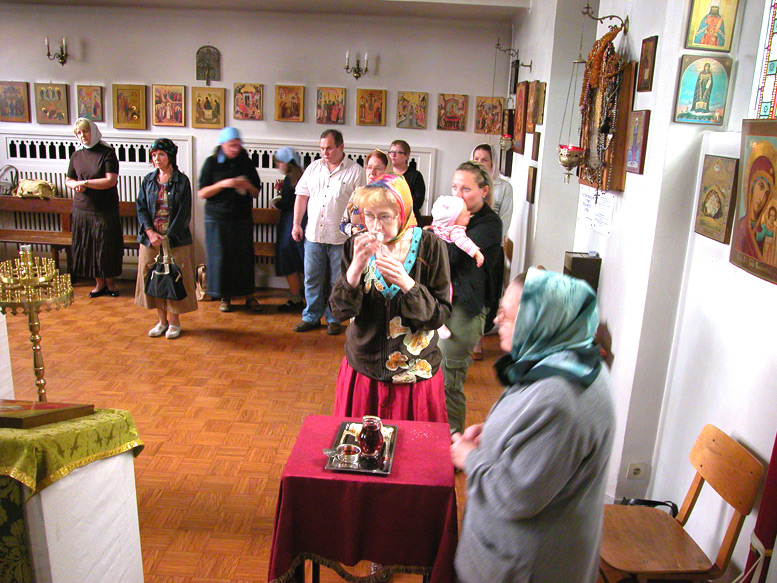Zapivka on:
[Wikipedia]
[Google]
[Amazon]
 Zapivka (
Zapivka (
 Zapivka (
Zapivka (Russian
Russian(s) refers to anything related to Russia, including:
*Russians (, ''russkiye''), an ethnic group of the East Slavic peoples, primarily living in Russia and neighboring countries
*Rossiyane (), Russian language term for all citizens and peo ...
: Запивка, "washing down") is the liturgical
Liturgy is the customary public ritual of worship performed by a religious group. ''Liturgy'' can also be used to refer specifically to public worship by Christians. As a religious phenomenon, liturgy represents a communal response to and partic ...
practice in certain Orthodox Churches
Orthodox Church may refer to:
* Eastern Orthodox Church
* Oriental Orthodox Churches
* Orthodox Presbyterian Church
* Orthodox Presbyterian Church of New Zealand
* State church of the Roman Empire
* True Orthodox church
See also
* Orthodox (di ...
and certain Byzantine Rite Catholic Churches whereby the faithful will partake of ''antidoron
The antidoron (, ') is ordinary leavened bread which is blessed but not consecrated and distributed in certain Eastern Orthodox Churches and certain Eastern Catholic Churches that use the Byzantine Rite. It comes from the remains of the loaves o ...
'' (blessed bread) and some wine diluted with warm water after receiving Holy Communion
The Eucharist (; from Greek , , ), also known as Holy Communion and the Lord's Supper, is a Christian rite that is considered a sacrament in most churches, and as an ordinance in others. According to the New Testament, the rite was instituted ...
.
The purpose of ''zapivka'' is to wash any remnants of the Body
Body may refer to:
In science
* Physical body, an object in physics that represents a large amount, has mass or takes up space
* Body (biology), the physical material of an organism
* Body plan, the physical features shared by a group of anima ...
and Blood of Christ
Blood of Christ, also known as the Most Precious Blood of Our Lord Jesus Christ, in Christian theology refers to (a) the physical blood actually shed by Jesus Christ primarily on the Cross, and the salvation which Christianity teaches was accomp ...
from the mouth lest anyone inadvertently spit some of the Sacred Mysteries
Sacred mysteries are the areas of supernatural phenomena associated with a divinity or a religious belief and praxis. Sacred mysteries may be either:
# Religious beliefs, rituals or practices which are kept secret from the uninitiated.
# Beliefs ...
(Eucharist) out. The method of partaking of the ''zapivka'' is to first take three sips of the warm wine, then consume the antidoron
The antidoron (, ') is ordinary leavened bread which is blessed but not consecrated and distributed in certain Eastern Orthodox Churches and certain Eastern Catholic Churches that use the Byzantine Rite. It comes from the remains of the loaves o ...
.
The clergy
Clergy are formal leaders within established religions. Their roles and functions vary in different religious traditions, but usually involve presiding over specific rituals and teaching their religion's doctrines and practices. Some of the ter ...
also partake of ''zapivka''. The priests and deacons who communicated will partake of the ''zapivka'' immediately after receiving Holy Communion, except for the deacon (or priest, if there is no deacon serving) who will perform the ablutions (consume the remaining Sacred Mysteries
Sacred mysteries are the areas of supernatural phenomena associated with a divinity or a religious belief and praxis. Sacred mysteries may be either:
# Religious beliefs, rituals or practices which are kept secret from the uninitiated.
# Beliefs ...
). He will then receive ''zapivka'' after finishing the ablutions. After consuming the ''zapivka'' all of the clergy will rinse their hands and their lips.
References
Eastern Christian liturgy Religious food and drink {{Catholic-org-stub